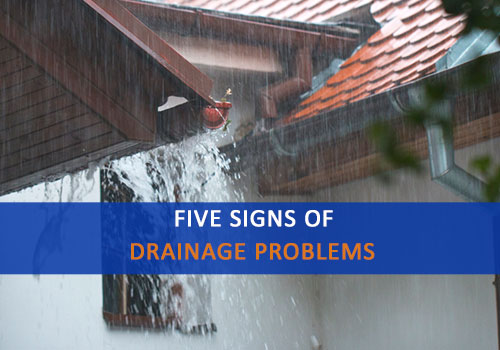It’s the end of August in Florida. That means hot weather, afternoon storms, and hurricane season. While Florida’s soil can handle the rain, once you make changes and add some landscaping, it may not be as ready to handle the downpours.
For septic owners, that spells trouble. With the last treatment using the ground’s natural filtration, if your yard has drainage problems, that could mean contaminated water isn’t getting treated before entering the groundwater.

Your Septic System Requires Good Drainage
Flooding can be disastrous for your septic system and the effective treatment of wastewater.
After solids are removed, wastewater is pushed from your septic tank to the drain field (also known as the leach field). Once there, it exits into the surrounding soil through the perforated holes in the drain field pipes. This is when your septic system uses the ground’s natural filtration process to complete the last phase of the wastewater treatment.
What happens if your yard is flooded or overly saturated?
In this instance, the last step in wastewater treatment doesn’t happen. It either enters the groundwater with contaminates still present, or it joins the puddles in your yard, making your yard unsafe and unhealthy to be in.
Both outcomes are less than ideal and pose health risks for your family and your community. So, it’s essential to identify drainage problems when they first arise.
Five Signs of Drainage Problems in Your Yard
Drainage issues start with clogged drains, poorly placed runoff canals, poorly draining soil, shaded yards that don’t dry out — it’s an endless list of reasons. As a home and septic owner, it’s essential to stay alert for the first signs of drainage issues and flooding.
Standing Water
One of the most obvious signs your yard isn’t properly draining, standing water, is a clear sign that water isn’t passing through your soil or yard quickly.
Ideally, your yard is designed to divert rainwater away from your home and landscaping. But if that’s not working, your yard may get stopped up with too much water.
Overflowing Gutters
If rainwater is spilling over the sides of your gutters or coming out the end like Niagara Falls, something is wrong.
Whether your gutters are clogged or too small for your area’s rain amounts, they aren’t helping properly drain rainwater away from your yard and septic system.
Water Stains in Your Basement/Lowest Level
If you notice water stains in your basement, it means you have flooding issues. It could be from surface water coming into your home, or it could mean groundwater is seeping in because it’s not filtering down fast enough.
For many Florida homes, basements are non-existent. Adding an extra concern when you start to see water stains and spots in your main living area.
Foundation Cracks
Over time, foundations develop small cracks. It’s just part of the process as the house settles and the foundation supports the weight of the home.
But, drainage problems can cause cracks of their own.
If you start noticing cracks are growing in size (large than 1/8″ in width) or new cracks appear, it’s time to call a structural engineer. Poor drainage could be causing issues with your foundation.
Septic Back-Ups
Waste and wastewater are supposed to flow through your system and away from your home. However, an overly saturated yard from drainage problems could cause the opposite to happen.
Remember how the drain field operates. Wastewater enters the perforated pipes and flows into the surrounding soil. However, if that soil is already soaked, no new water can enter. Your septic system comes to a standstill. And as you add more water into your system, it begins to backup and flows back into your home.
Helping Your Yard Avoid Drainage Problems
While we can’t control the weather, we can prepare your yard to better handle the rain. Here are a few tips to keep your yard ready for the rain:
- Create stormwater runoff canals that divert rainwater from your yard.
- Maintain and clean storm gutters regularly.
- Use fast-draining soil throughout your yard.
- Avoid trees and shrubs with dense root balls. Utilize native plants and landscaping that handle your area’s weather easily.
- Use less water the days following a storm to give your system a break.
Florida Septic Systems and Care
It rains a lot in Florida, especially during the hurricane season. While we worry about preparing our homes, we don’t often think about your yard and septic system. A little prep can go a long way to help avoid drainage problems and septic issues.

